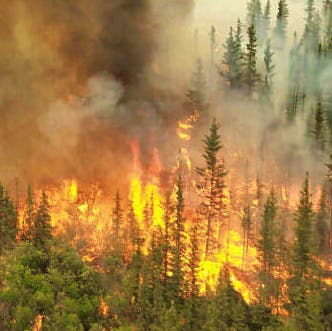This post originally appeared on the High Country News blog, The Range.
They don’t call it the Wild West for nothing. From crippling droughts to raging fires, the region is no stranger to natural disasters. But will it be able to weather the storm ahead?
Already, 2011 has been a record-setting year for extreme weather events. And scientists predict that as climate change continues, we’re in for even harder times. For a region heavily dependent on farming, ranching and outdoor recreation, this pattern threatens not only communities, wildlife and natural resources, but local economies as well.
And natural disasters aren’t the only way climate change is leaving its mark in the West. Rising temperatures are allowing pests like the pine bark beetle to thrive, decimating forests and increasing the risk of fire. Warming streams are reducing habitat for coldwater fish like trout and salmon. And the U.S. Geological Survey predicts that by the year 2030, the glaciers of Montana’s Glacier National Park will be no more than a memory. In order to stop these trends, it’s critical we take action now.
Fortunately, the West has a leader who intends to do just that. Senator Max Baucus. D-Mont., has joined forces with Senator Sheldon Whitehouse, D-R.I, to tackle the challenge of preparing for these changes head-on. This month, the two senators introduced legislation that outlines the countless benefits that healthy natural resources provide to our country’s safety, economy and well being, and offers a roadmap for how to help them adapt to a more hostile climate. The bill does not call for money, but aims to strengthen climate change adaptation efforts across the government, requiring federal agencies to plan for the projected long-term effects of climate change and encouraging states to follow suit. From combating pests in forests in order to prevent fires to restoring watersheds to protect drinking water supplies, the Securing America’s Future and Environment (SAFE) Act provides practical solutions to prepare ourselves and vulnerable natural resources for an uncertain future.
“In Montana, where our outdoor heritage grounds us and defines us as a people, we know that healthy public lands mean more tourism, more support for our Montana businesses, and more jobs.” – Sen. Max Baucus
The SAFE Act is also an investment plan, helping government agencies reduce their long-term costs by determining the most effective ways to protect and conserve our country’s natural resources. Upon the bill’s release Sen. Baucus said, “In Montana, where our outdoor heritage grounds us and defines us as a people, we know that healthy public lands mean more tourism, more support for our Montana businesses, and more jobs.” He recognizes that stronger natural resources mean stronger communities and economies, and that fortifying Montana’s natural resources now will save the state time, money and energy down the road.
Instead of waiting for the next natural disaster to strike, 2011 should be America’s wake-up call. We need to start planning now to be sure that we are ready for whatever challenging future climate change holds. Two innovative senators have taken the first step. Now it’s our turn to come out strong behind them and support their efforts to protect the wildlife and natural places that makes this country so great.
The West may still be wild, but we should do everything in our power to keep its communities, wildlife and natural resources SAFE.
Learn more:
See the original post on High Country News.
Read more about the SAFE Act and the promise it holds for America’s wildlife and natural places.



